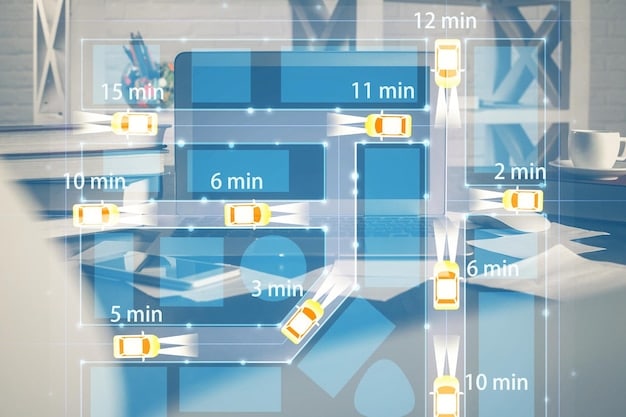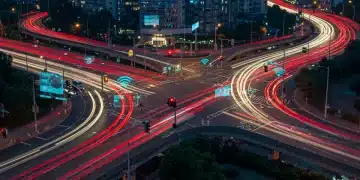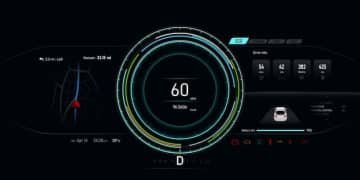Smart Waste Management: Cut Costs 30% with Smart Bins & Route Optimization

Smart waste management leverages IoT-enabled smart bins and route optimization to enhance efficiency, reduce operational costs, and improve environmental outcomes in waste collection, potentially cutting costs by up to 30%.
Are you looking to revolutionize your city’s waste management system? Discover how smart bins and route optimization can cut collection costs by 30%, enhancing urban sustainability and efficiency.
Understanding the Challenges of Traditional Waste Management
Traditional waste management systems often face significant challenges that impact both municipal budgets and environmental sustainability. These challenges range from inefficient collection routes to overflowing bins, leading to increased costs and negative environmental consequences.
Inefficient Collection Routes and High Operational Costs
Traditional waste collection often operates on fixed schedules, regardless of actual bin fill levels. This results in trucks making unnecessary trips to empty bins that are not full, driving up fuel consumption, labor costs, and vehicle wear and tear.
Environmental Impact of Waste Collection
The environmental impact of traditional waste management is considerable. Unnecessary truck trips increase carbon emissions, contributing to air pollution and climate change. Moreover, overflowing bins can lead to littering and contamination of surrounding areas.
These inefficiencies highlight the need for smarter, more responsive waste management solutions that can adapt to real-time conditions and minimize both financial and environmental burdens.
The Rise of Smart Bins: IoT in Waste Management
Smart bins represent a transformative shift in waste management, leveraging Internet of Things (IoT) technology to provide real-time data on fill levels and waste composition. This data enables more efficient and responsive waste collection strategies.
How Smart Bins Work: Sensors and Data Transmission
Smart bins are equipped with sensors that monitor fill levels, temperature, and even the type of waste inside. This data is transmitted wirelessly to a central management system, providing a comprehensive overview of waste accumulation patterns.
Benefits of Using Smart Bins: Efficiency and Cost Savings
- Real-time Monitoring: Smart bins provide up-to-the-minute data on fill levels, allowing collection crews to focus on bins that actually need emptying.
- Reduced Overflows: By monitoring fill levels, smart bins prevent overflows, reducing litter and improving public hygiene.
- Optimized Collection Routes: Data from smart bins enables the creation of optimized collection routes, reducing unnecessary trips and saving fuel.
By integrating smart bins into waste management systems, cities can significantly reduce operational costs, improve environmental outcomes, and enhance the quality of life for residents.

Route Optimization: Maximizing Efficiency in Waste Collection
Route optimization involves using advanced algorithms and real-time data to plan the most efficient collection routes. This approach minimizes travel time, fuel consumption, and labor costs, leading to significant savings in waste management operations.
Utilizing Algorithms and Real-Time Data for Route Planning
Route optimization software analyzes various factors, including bin fill levels, traffic conditions, and vehicle capacity, to generate the most efficient routes. These routes are continuously updated based on real-time data, ensuring optimal performance.
Case Studies: Successful Implementation of Route Optimization
Several cities have successfully implemented route optimization in their waste management systems. For example, the city of Palo Alto, California, reduced its waste collection fleet by 25% through the use of route optimization software.
Route optimization not only reduces costs but also improves the environmental sustainability of waste management by minimizing fuel consumption and carbon emissions. This makes it a crucial component of any modern waste management strategy.
Integrating Smart Bins and Route Optimization: A Synergistic Approach
The true potential of smart waste management is realized when smart bins and route optimization are integrated into a cohesive system. This synergistic approach maximizes efficiency and cost savings while minimizing environmental impact.
How Combined Technologies Enhance Waste Management
When smart bins provide real-time fill level data, route optimization software can dynamically adjust collection routes to prioritize bins that need emptying. This ensures that collection crews are always operating at peak efficiency.
Data Analytics and Predictive Waste Management
- Identifying Trends: Data analytics can reveal patterns in waste generation, enabling cities to anticipate future needs and allocate resources more effectively.
- Improving Resource Allocation: By understanding waste composition, cities can optimize recycling programs and reduce the amount of waste sent to landfills.
- Enhancing Public Services: Predictive waste management ensures that bins are emptied before they overflow, improving public hygiene and satisfaction.
By leveraging data analytics, cities can move from reactive to proactive waste management, creating a more sustainable and efficient system. This approach not only saves money but also improves the overall quality of life for residents.

Overcoming Implementation Challenges and Ensuring Success
Implementing smart bins and route optimization systems can present certain challenges, including technological issues, data privacy concerns, and resistance to change. Addressing these challenges proactively is essential for ensuring a successful transition.
Addressing Technological Issues and Data Privacy Concerns
Ensuring the reliability of sensor technology and the security of data transmission is critical. Cities should invest in robust systems with encryption and redundancy to protect against data breaches and system failures.
Strategies for Managing Change and Gaining Stakeholder Buy-In
Resistance to change can be a significant barrier to implementation. Engaging stakeholders early in the process and providing comprehensive training and support can help overcome this resistance.
Successful implementation requires careful planning, stakeholder engagement, and ongoing monitoring to ensure that the system is operating effectively and delivering the expected benefits. This proactive approach minimizes risks and maximizes the potential for long-term success.
The Future of Waste Management: Innovations and Trends
The field of waste management is rapidly evolving, with new technologies and approaches constantly emerging. Staying abreast of these innovations and trends is crucial for cities looking to build sustainable and efficient waste management systems.
Emerging Technologies: AI, Robotics, and Advanced Sensors
Artificial intelligence (AI) is being used to analyze waste composition and optimize sorting processes. Robotics is automating waste collection and processing, reducing labor costs and improving efficiency. Advanced sensors are providing more detailed data on waste characteristics, enabling more precise and targeted waste management strategies.
Sustainable Practices and the Circular Economy
The principles of the circular economy, which aim to minimize waste and maximize resource utilization, are gaining increasing traction in waste management. This involves designing products for recyclability, promoting reuse, and recovering valuable materials from waste streams.
By embracing these emerging technologies and sustainable practices, cities can create waste management systems that are not only efficient and cost-effective but also environmentally responsible and resilient.
| Key Point | Brief Description |
|---|---|
| 💡 Smart Bins | IoT-enabled bins monitor fill levels in real-time. |
| 🗺️ Route Optimization | Algorithms plan efficient waste collection routes. |
| 💰 Cost Reduction | Combined technologies can cut collection costs by 30%. |
| ♻️ Sustainability | Reduced emissions & efficient resource use support green goals. |
Frequently Asked Questions (FAQ)
▼
Smart bins use sensors to detect fill levels, enabling targeted collections. This reduces unnecessary trips, saving fuel and labor costs, thereby optimizing waste management efficiency.
▼
Route optimization uses real-time data and algorithms to plan the most efficient collection routes. This minimizes travel time and fuel consumption, leading to substantial cost savings.
▼
Smart waste management reduces carbon emissions by optimizing collection routes and preventing overflows. This contributes to cleaner air, less litter, and supports overall environmental sustainability.
▼
Cities can address challenges by ensuring robust data security, engaging stakeholders early on, and providing comprehensive training. This minimizes resistance and maximizes the long-term success of the system.
▼
Future innovations include AI-driven waste sorting, robotic collection systems, and advanced sensors. These technologies will enhance efficiency, reduce labor costs, and enable more precise waste management strategies.
Conclusion
Adopting smart bins and route optimization offers a powerful strategy to revolutionize waste management, slashing costs, boosting efficiency, and promoting environmental responsibility. By integrating these technologies, cities can achieve substantial cost savings and improve quality of life for their residents.





